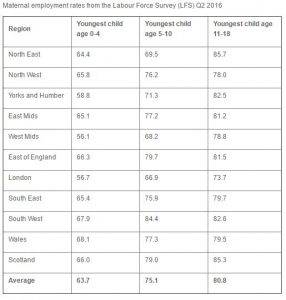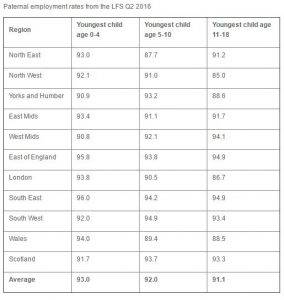September 5, 2016
Mothers with young children a third less likely to be in work than fathers 0
 The growing body of evidence highlighting the challenges faced by working mothers has been broadened with the publication of a new report from the TUC which claims that mothers with young children are a third less likely to be in work than fathers. The TUC found that on average just 64 percent of mothers with children aged 0-4 are in paid work, compared to 93 percent of fathers. The analysis claims that the age of a woman’s youngest child has an influence on whether or not she works. The employment rate for mums increases by 11 percent to 75 percent for women with children at primary school (aged 5-10) and by 17 percent to 81 percent for mothers with secondary school age children (11+). For dads of pre-school children, employment rates are above 90 percent. This suggests that mothers’ work decisions are affected by regional variations in the availability and cost of childcare, transport and housing, and access to good quality flexible and part-time jobs.
The growing body of evidence highlighting the challenges faced by working mothers has been broadened with the publication of a new report from the TUC which claims that mothers with young children are a third less likely to be in work than fathers. The TUC found that on average just 64 percent of mothers with children aged 0-4 are in paid work, compared to 93 percent of fathers. The analysis claims that the age of a woman’s youngest child has an influence on whether or not she works. The employment rate for mums increases by 11 percent to 75 percent for women with children at primary school (aged 5-10) and by 17 percent to 81 percent for mothers with secondary school age children (11+). For dads of pre-school children, employment rates are above 90 percent. This suggests that mothers’ work decisions are affected by regional variations in the availability and cost of childcare, transport and housing, and access to good quality flexible and part-time jobs.
 There are also regional differences in maternal employment rates. In London, the West Midlands and Yorkshire and Humberside, fewer than 6 in 10 mothers of pre-school children are in work. In Wales, the South West, East of England and Scotland this rises to nearer to 7 in 10.
There are also regional differences in maternal employment rates. In London, the West Midlands and Yorkshire and Humberside, fewer than 6 in 10 mothers of pre-school children are in work. In Wales, the South West, East of England and Scotland this rises to nearer to 7 in 10.
TUC General Secretary Frances O’Grady said: It’s worrying that so many women with young children are locked out of work because they have kids. We need to share parenting more equally – else the gender pay gap will take decades to close. “We also need to do more to support working mums. That means making sure that affordable childcare is available from the end of maternity leave to the start of school. And we need employers to help too. We need vastly more good quality part-time and flexible jobs. And employers have to be flexible too – like when kids start school and are on shorter hours for the first few weeks.”
 Commenting on the research BCC Acting Director General Adam Marshall said: “While businesses and unions may not agree on everything, both believe the case for more action on childcare is clear. Too many parents – in particular women – are losing out on opportunities at work, too many firms are losing talented employees, and the UK economy as a whole is paying the price. Good, affordable childcare is essential business infrastructure, and we need to look at new ways to drive costs down and drive provision up all across the UK.”
Commenting on the research BCC Acting Director General Adam Marshall said: “While businesses and unions may not agree on everything, both believe the case for more action on childcare is clear. Too many parents – in particular women – are losing out on opportunities at work, too many firms are losing talented employees, and the UK economy as a whole is paying the price. Good, affordable childcare is essential business infrastructure, and we need to look at new ways to drive costs down and drive provision up all across the UK.”
Around 370,000 working mothers have their youngest child starting primary school this September and the transition to school can present new opportunities. But there are challenges for parents of school age children too, says the TUC. Some may have to change their working hours to fit with the shorter school day, depending on the availability of wrap-around care in their area or whether or not they have support networks that can help with school drop-offs and pick-ups. Many schools have a staggered start to help young children settle into school life, which can mean a couple of weeks at the beginning of the reception year when children may only be doing half days.
With this in mind the TUC is asking employers to:
- Be supportive of working parents and show some flexibility if needed to help them adapt to different childcare pressures once children start school.
- Let parents use parental leave as flexibly as possible to help them cover school holidays or temporary changes to school hours.
















